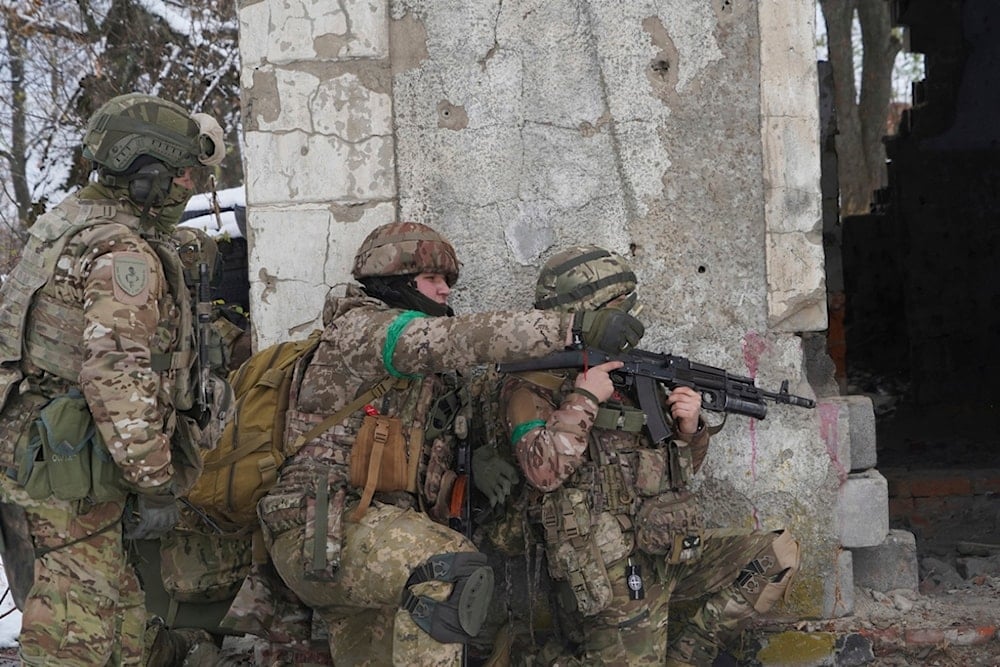What are the implications of allowing Ukraine to strike inside Russia?
The US decision is said to be a response to Russia's escalation, particularly the reported deployment of DPRK troops to Kursk—a claim for which Western officials have yet to present concrete evidence.
-

Ukrainian servicemen of 57th motorised brigade improve their tactical skills on an obstacle course at the training field in Kharkiv region, Ukraine Thursday, Nov. 14, 2024. (AP)
France and the United States have signaled a significant shift in the Ukraine war, granting Kiev permission to strike deep into Russian territory with advanced missiles.
French Minister Jean-Noel Barrot confirmed on Monday that France remains open to allowing Ukraine to use long-range missiles against Russian military targets, stating, "We openly said this was an option... to strike a target from where Russia is currently aggressing Ukrainian territory."
This position aligns with the US decision to permit the use of US-made Army Tactical Missile Systems (ATACMS) inside Russia.
Biden greenlights ATACMS
According to an analysis by CNN, the Biden administration's approval of Ukraine's use of ATACMS marks a significant reversal of its earlier hesitation, following a familiar pattern of initial reluctance to grant Kiev's requests for advanced weaponry, such as HIMARS, Abrams tanks, and F-16s.
While this decision enhances Ukraine's military capabilities, analysts suggest it is unlikely to be a game-changer due to the limited supply of ATACMS and their relatively short range compared to Russia’s vast geographical expanse. The missiles, with a maximum range of 300 kilometers (190 miles), are expected to target high-value Russian military sites. Reports indicate that Russian airfields within range of these missiles have already relocated attack aircraft further inside Russian territory.
Read more: Biden authorizes Ukraine's use of ATACMs for strikes inside Russia
Despite these new capabilities, Ukraine has demonstrated its ability to penetrate Russian defenses with domestically produced drones, which have caused significant disruption at Moscow’s airports and within its energy infrastructure, the analysis notes.
However, the report overlooks significant internal challenges facing Ukraine, such as troop shortages and corruption scandals within its military and government. Speaking to Ukrainskoye Radio on Saturday, Ukrainian President Volodymyr Zelensky acknowledged the strain on exhausted brigades at the frontlines and the difficulties in mobilizing adequately trained reinforcements.
“We have not mobilized enough troops,” Zelensky admitted, referencing two laws enacted earlier this year aimed at addressing these deficiencies.
Escalation and Global Implications
The US decision is said to be a response to Russia's escalation, particularly the reported deployment of DPRK troops to Kursk—a claim for which Western officials have yet to present concrete evidence.
Given the pronounced bias in much of the Western media's coverage, such reports are likely to be fabrications or exaggerated narratives designed to justify escalatory measures. Nonetheless, the Biden administration has framed this "move" as an escalation warranting a proportional response.
While Kiev has welcomed the decision, concerns persist about provoking a retaliatory response from Moscow.
The CNN analysis highlights the potential for Russia to restore its deterrence through sabotage or attacks on civilian infrastructure in Europe. However, recent reports of explosive packages planted on European courier planes further illustrate how such narratives can sometimes serve to amplify fears, despite the absence of conclusive evidence.
A War Trump Will Inherit
According to CNN, the timing of these decisions—just before President-elect Donald Trump takes office—adds complexity to the geopolitical challenges he will inherit.
While Trump has expressed an interest in negotiating peace, the conflict has entered a new phase marked by deeper US involvement and significantly heightened stakes.
Read more: Trump allies say Biden trying to ignite WWIII over ATACMS decision
As the war intensifies, decisions of this nature amplify the mounting risks of further escalation for Western powers.
Earlier today, French political figure Florian Philippot warned that Russian officials might interpret such decisions as NATO's direct involvement in the conflict, potentially provoking a severe and devastating response.
Attention ! Il y a quelques jours Maria Zakharova, porte-parole de la diplomatie russe, avait prévenu : « Si l’#Ukraine est autorisée à mener ces frappes sur le sol russe, nous considérerons cela comme l’entrée effective des pays de l’OTAN dans un conflit armé avec la #Russie » !… pic.twitter.com/4u52UxDkm5
— Florian Philippot (@f_philippot) November 18, 2024

 4 Min Read
4 Min Read









